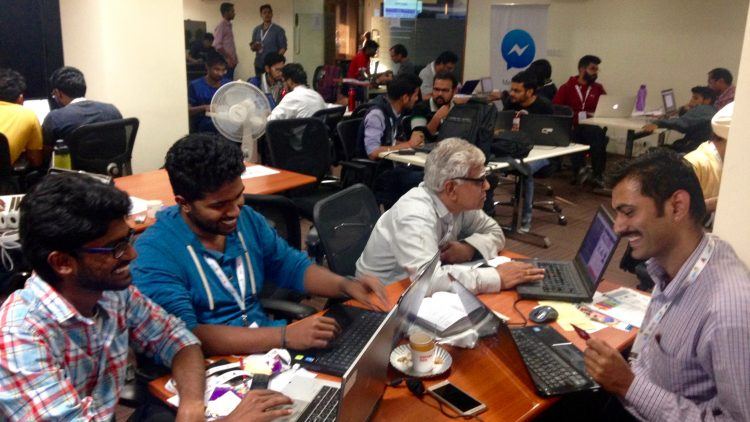
Bot builders ranged from university students to engineers in their 60s. Photo credit: Tech in Asia.
It’s Saturday afternoon. As a hundred odd engineers in teams of two or three clack away at their keyboards in the TLabs’ offices in Bangalore, one of them leans back in his chair for a moment, taking a break. He clicks his pen noisily over and over, then looks up and locks eyes with someone across the room.
“Is this annoying you?” he calls out, waving the pen. He squints at his friend’s mumbled response and shakes his head. “Are you sure?” he asks, then continues with his tick. Around him, the occasional barefoot engineer lounges on a beanbag, alternatively typing up code and sipping chai. It’s hard to tell what time it is – all the windows have been covered, but a little bit of sunlight peeks through, meaning it’s not yet night.
About 125 participants made the cut for the competition
This isn’t a normal hackathon. These developers have specifically signed up to build bots in what event partners TLabs, conversational commerce startup Haptik, and talent discovery platform Venturesity have dubbed a “botathon.”
Someone once described a hackathon as doing homework the night before it was due, but with fire. The TLabs office was decidedly cool – the event had started at 8 am, but the bot building hadn’t truly begun until three hours later, with hackers trickling in into the afternoon (“It’s a Saturday morning. I sleep a lot on Saturday,” an engineer told me).
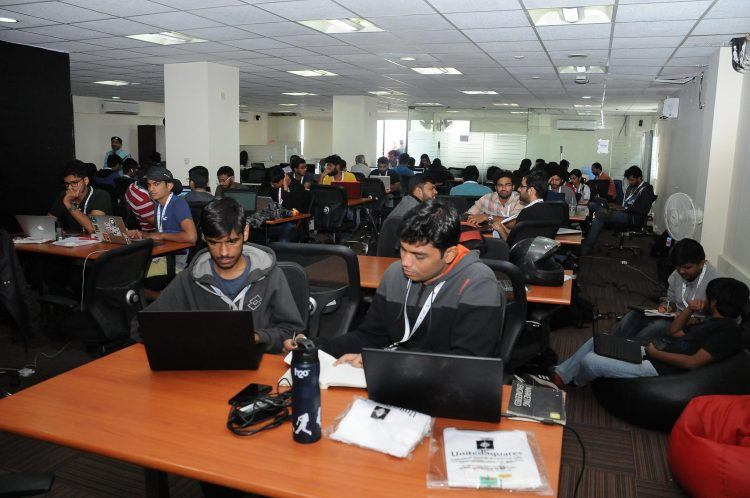
This doesn’t fit in the engineers sprawled out on the floor. Photo credit: TLabs.
Though chill on the outside, urgency hung in the air, best showcased by the pen-clicker. Plenty would happen under the surface of the between Saturday morning and Sunday afternoon, when 10 of the best teams would present their bots for a chance to win US$225, US$450, and US$890 respectively, along with FbStart memberships that include free Facebook and Amazon Web Services cloud credits.
See: Bots invade Line
The fruitless frenzy
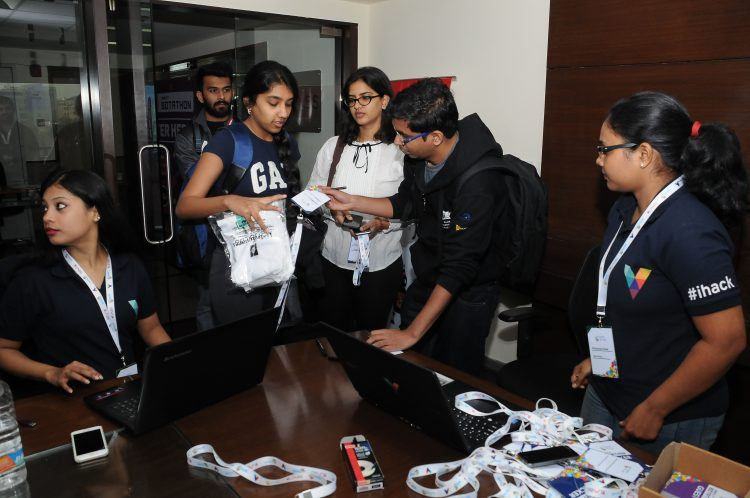
Team Ozz checks in. Photo credit: TLabs.
The bot tech frenzy arguably began around April this year, when Facebook released its Messenger bot API. Bot builders can also turn to platforms like Slack, Line, Telegram, and Skype to build a conversational magnum opus. However, while much hyped, the tech is so new that it’s hard to connect the theory to practice.
Tech in Asia wrote about decent and useless bots this summer. My own foray into the world of bots ended in frustration. One particularly terrible one took eight hours to respond to me. Imagine being stood up by something that is literally programmed not to have anything better to do than talk to you.
“The reason everything sucks currently is because most of the hype right now is built by these [bot] platforms […] and the developer community, but the real world and the mainstream world don’t have any clue what bots are,” Bottr startup founder and former TLabs chief manager Abhimanyu Godara explains. The real world “doesn’t give a shit. They only care about if they get any benefit out of it.”
The key is to put laptops away and focus on creating a user experience
The idea for this botathon came from a similar place.
“A lot has been said about chatbots, and now we’ve ultimately learned what works and what does not,” Haptik CEO Aakrit Vaish tells Tech in Asia. Putting that knowledge under pressure and seeing what comes out is what the weekend is all about.
Participants were allowed to build on any bot platform they wanted – including building a bot from the ground up and an app to go with it – as long as the tools were open-source and didn’t require special access. Bots would be evaluated on the problem they were trying to solve, then the development itself.
Fresno Capital hosted its own bot hackathon with e-Zest in Pune in July.
See: So you think you can hack? Here’s a 5-step guide to winning at a hackathon.
The botathon scene
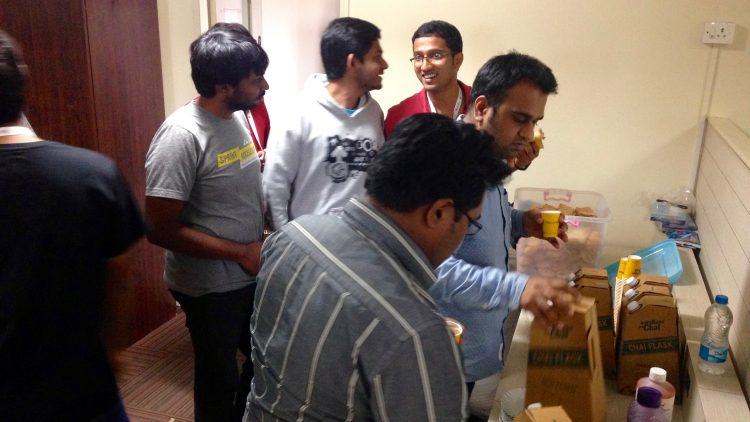
Chai: an engineering necessity. Photo credit: Tech in Asia.
About 125 participants made the cut for the competition, after submitting their LinkedIn profiles, and what they wanted to build. Aakrit says they were expecting around half of the applicants to show up. They ended up getting 100 people who split into 43 teams.
Visa software engineer Swarndeep Arora and Microsoft developer Anshuman Dhamoon make up the CStrikers team. Former college roommates, they tell me that they used to do hackathons together back in the day and saw the competition as the perfect reason to reunite, as they now live in two different cities.
They admit that they’re a little concerned that the event lacks Red Bull.
Hackathons are only stressful if you want them to be, they tell me calmly, though they admit that they’re a little concerned that the event lacks Red Bull. It’s late in the afternoon when we speak, and they’ve just started working, preferring to take time to solidify their idea – a fitness tracking and motivation bot.
The true sense of a hackathon comes at night, when you start to see who’s in the game or not, they tell me, confident that they’ll finish their bot by 11 pm.
Not everyone came in with as much experience. Members of team Ozz – Sameksha Reddy, Sonika Ravula, and Akshay Kulkarni – were experiencing their first hackathon and were hoping to gain experience. Meanwhile, Rajat Soni and Abhishek Satr of the team Dreamcorp Labs flew in from Mumbai just for the event and planned to fly right back out after the final presentations.
See: Upset about Trump’s win? This penguin chatbot helps combat depression
Besides the occasional tossed aside espresso cup, it’s organized but busy. I get good at waiting for people to take bathroom or smoke breaks so that I can squeeze into newly vacant chairs to talk to the developers. I quickly realize that hackathons are more a way of life than I previously realized.
“Hackathons are a hobby for me,” participant Arvind Thangamani tells me. He and his partner Ganessh Kumar – team Sven – laugh when I grimace at the sleepless nature of the competition. They’re making a Slack bot that controls music playlists for a group.
See: Why chatbots suit India better than apps
The botblock
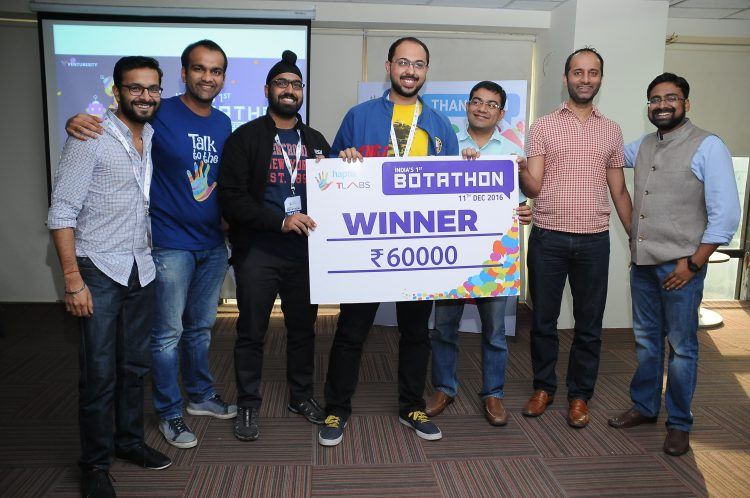
CStrikers: winners on their way to Bali. Photo credit: TLabs.
However, according to Abhimanyu, a mentor for the competition, a lot of participants were missing the forest for the trees.
“Everybody’s jumping on the technology aspect, which is the easy part, personally speaking,” he confides. “Why would anybody use it? Unless that experience is 10 times – ideally 100 times better than the existing bots inside your app – no one is going to use it – doesn’t matter if you’re building on Slack or Messenger.”
The key is to put laptops away and focus on creating a user experience, something that sent a lot of teams back to the drawing board come Saturday evening.
If you’ve ever pulled an all-nighter, you’ll understand what Sunday looked like.
If you’ve ever pulled an all-nighter, you’ll understand what Sunday looked like. Some of the hacking soldiers had fallen into the night and didn’t return. People were nodding off in the back as the final 10 groups gave presentations on everything from movie ticket booking to intimacy issues to flirting aids. Team Ozz’s presentation was particularly meta: a bot for testing bots.
Team CStrikers (fitness bot) ultimately emerged the winners, followed by Brocorp (restaurant server bot) and Sven (work DJ bot) in second and third place, respectively. According to the judges, CStrikers was the clear winner – though their presentation froze up, they were the only ones who presented a business plan for their bot.
Team members Swarndeep and Anshuman didn’t end up stopping work at 11 pm – they worked late into the night, went home to work, then came back the next morning to work some more. I asked if they had plans to sleep. They shook their heads.
“We’re going to Bali!” they exclaimed.
See: So what if the Internet sucks in India? This AI chatbot gets things done
This post What went down at Bangalore’s first bot hackathon appeared first on Tech in Asia.
from Tech in Asia https://www.techinasia.com/botathon-bangalore-haptik-tlabs-venturesity
via IFTTT
No comments:
Post a Comment